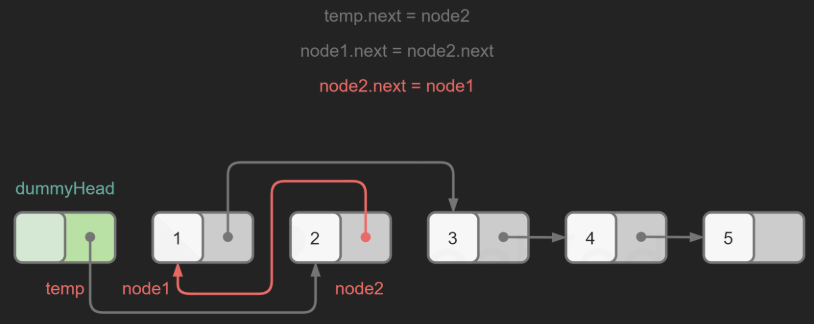两两交换链表中的节点(swap-nodes-in-pairs)
Given a linked list, swap every two adjacent nodes and return its head.
You may not modify the values in the list’s nodes. Only nodes itself may be changed.
Example 1:

Input: head = [1,2,3,4]
Output: [2,1,4,3]
Example 2:
Input: head = []
Output: []
Example 3:
Input: head = [1]
Output: [1]
代码与思路
迭代
来自——两两交换链表中的节点(swap-nodes-in-pairs)官方

这里定义了一个哑节点,获取了node1,node2,交换它们,temp指针再向前走就可以了。注意,终止条件是 temp的后面没有节点或者只有一个节点,则没有更多的节点需要交换,因此结束交换。迭代的话,想清楚,终止条件是什么非常关键。
class Solution {
public:
ListNode* swapPairs(ListNode* head) {
//定义一个哑节点
ListNode* dummyHead = new ListNode(0);
dummyHead->next = head;
ListNode* temp = dummyHead;
while (temp->next != nullptr && temp->next->next != nullptr) {
//准备待交换的节点
ListNode* node1 = temp->next;
ListNode* node2 = temp->next->next;
//交换
temp->next = node2;
node1->next = node2->next;
node2->next = node1;
//移动指针
temp = node1;
}
//返回
return dummyHead->next;
}
};
递归(有点难度)
public ListNode swapPairs(ListNode head) {
//边界条件判断
if (head == null || head.next == null)
return head;
//从第3个链表往后进行交换
ListNode third = swapPairs(head.next.next);
//从第3个链表往后都交换完了,我们只需要交换前两个链表即可,
//这里我们把链表分为3组,分别是第1个节点,第2个节点,后面
//的所有节点,也就是1 → 2 → 3,我们要把它变为2 → 1 → 3
ListNode second = head.next;
head.next = third; //你可能会觉得,这里不是指向1吗
second.next = head;
return second;
}
说明 head.next = third;你可能会觉得奇怪,这里不是指向1那个节点吗,为什么是指向3,注意了,这里跟迭代的方式有点不一样,我们返回的是一个新的头结点,它叫second。所以,我们用second来连接后面的节点,你也可以调整一下代码格式,这样子看。
head.next = third;
second.next = head;
也就是说second -> head -> third。
其它
ListNode 的定义
Definition for singly-linked list.
struct ListNode {
int val;
ListNode *next;
ListNode() : val(0), next(nullptr) {}
ListNode(int x) : val(x), next(nullptr) {}
ListNode(int x, ListNode *next) : val(x), next(next) {}
};